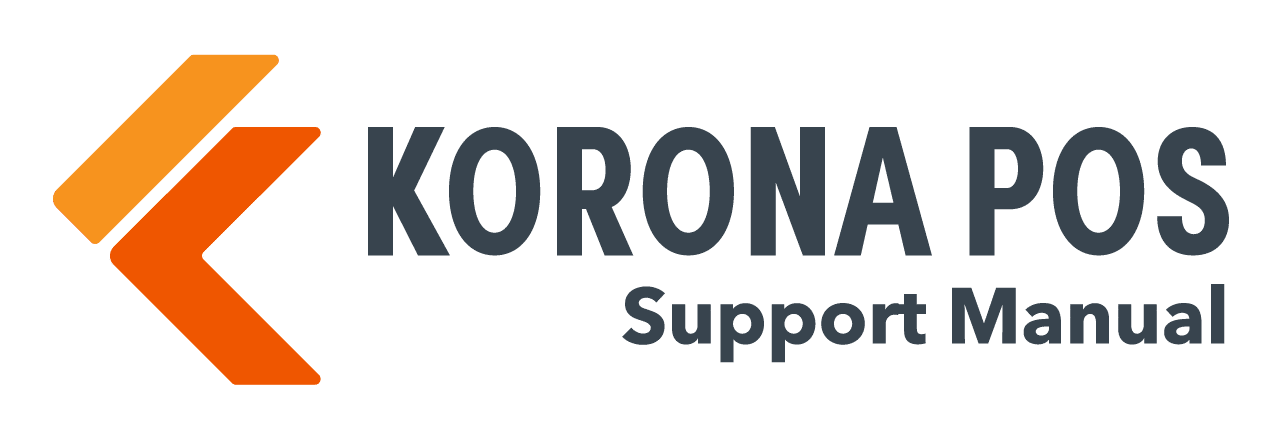These Settings are not available to the merchant and must be updated by the Processor / KORONA POS.
*Note: These are example typical settings and might not be applicable in every situation. We recommend batching your PAX terminal before making any changes to these settings.
Store and Forward
- Allow Store&Forward – Disabled
Fast Payment Service
- Allow Fast Payment – Enabled or Disabled to allow tap payments.
- Authorization Limit – Monetary limit to purchase amount.
- Receipt Mode – Merchant / Customer receipt printing options.
Industry Features
- Industry Type – Retail or Restaurant
- Invoice Mode – Disabled
- Split Tender – Enabled
Host Features
- Commercial Card Support – Disabled
- Allow MOTO – Enabled, allows acceptance of Mail Order or Telephone Order transactions.
- Local Duplicate Check – Disabled
- Local Duplicate Check for ECR Reference Number – Enabled
Credit Features
- Credit EDC Support – Enabled
- Transactons
- Sale – Enabled
- Verify – Enabled
- Refund – Enabled
- Balance Inquiry – Enabled
- Void Sale – Enabled
- Void Forced – Enabled
- Void Refund – Enabled
- Pre-Authorization – Enabled
- Completion – Enabled
- Void Pre-Authorization – Enabled
- Void Completion – Enabled
- Credit Manual Entry
- Sale – Enabled
- Verify – Enabled
- Forced – Disabled
- Refund – Enabled
- Balance Inquiry – Enabled
- Pre-Authorization – Enabled
Debit Features
- Debit EDC Support – Enabled
- Transactions
- Sale – Enabled
- Refund – Enabled
- Balance Inquiry – Enabled
- Void Sale – Enabled
- Void Refund – Enabled
- Re-Enter – Enabled
EBT Features
- EBT EDC Support – Enabled
- Transactions
- Sale – Enabled
- Refund – Enabled
- Withdrawal – Enabled
- Balance Inquiry – Enabled
- Void Sale – Enabled
- Void Refund – Enabled
- Re-Enter – Enabled
- EBT Manual Entry
- Sale – Enabled
- Refund – Enabled
- Withdrawal – Enabled
- Balance Inquiry – Enabled
General
- Input Mode – Input Tip Amount
- Tip Suggestions – Enables / Disables tip suggestions.
- Three Flat Configurable Amounts – Allows setting three fixed tip amounts for customer selection.
- Three Percentage Configurable Amounts – Allows setting three tip percentages for customer selection.
General Settings
- ECR-Terminal Integration Mode – External POS
- No Paper Mode – Auto Check
- Swipe Any Time – Enabled
- Swipe/Tap Priority – Swipe First
Semi Integration Only
- Support Print – Disabled
- Record Failed Transaction – Enabled
- Contactless – Enabled
General
- Primary Comm Type – Ethernet
- Backup Comm Type – Ethernet
- Ping URL – URL of website for testing ping.
- Ping Timeout (ms) – Sets the timeout for ping
Semi-Integration Only
Communication Between ECR/POS and PAX Terminal
- Limit Length – 4096
- Port – 10009
- Communication Type – Ethernet
- UART Baudrate – 9600bps
- Protocol Type – TCP/IP
- ECR Request Timeout (100ms) – 30
- Secondary Port – 10010
POS System Feature (Ethernet Only)
- Access Control Allow Origin for HTTP/HTTPS – Enabled
Terminal Register
- POS Auto Register – Disabled
- POS Register Type – PAX
Enable / Disable EMV
- Enable EMV Feature – Enabled
EMV Features
- EMV Card Remove Beep – One Beep
- Support Fallback to Swipe – Enabled
Visa / MasterCard / Amex EMV Parameters
- Contactless Trans Limit – Dollar amount limit for tap transactions.
- Contactless Online Floor Limit – Dollar amount that does not require an online authorization from card issuer.
- CVM Required Limit – Dollar amount to require PIN or signature.
Quick Chip Parameters
- Enable Quick Chip – Enabled
- Insert Any Time – Disabled
Merchant Parameters
- Bank Identification Number – 6 digit number that identifies the bank the pax will deposit to.
- Agent Bank Number – 6 digit number that identifies the agent/agency’s bank.
- Agent Chain Number – 6 digit number that identifies the chain of agents/agencies in a transaction.
- Merchant Number – 12 digit number that identifies the business or merchant.
- Store Number – 4 digit number that identifies a specific payment device.
- Terminal Number – 4 digit number that identifies a specific payment device.
- Merchant Name – Name of the merchant.
- Merchant City – City of the merchant.
- Merchant State – State of the merchant.
- City Code – Unique identifier for a specific city.
- Country Code – Characters or Name representing a specific country.
- Currency Code – 3 digit / character value that identifies the specific currency used.
- Merchant ABA Number – 9 digit bank routing number of the merchant.
- Merchant Category Code – 4 digit code that represents the category of what the merchant sells.
- Merchant Settlement Agent Number – Identifier for the agent who handles the merchant’s settlements.
- RIID – Reference number assigned to a specific transaction or merchant account.
- Sharing Group – Identifier assigned by the payment processor that determines how a merchant account is routed in their system.
- Time Zone Differential – 3 digit code that is used to calculate the local time.
- Language Indicator – 2 digit code that designates the language to be used.
- Terminal ID Number – 8 digit number, usually with a leading zero or seven, that identifies a specific merchant terminal.
- Reimbursement Attribute – Specific flag or code that tells the processor or gateway how to classify and handle certain transaction types, usually for settlement or fee purposes.
- Application ID – ID of the payment application / software.
- FCS ID – ID used to track / manage / prevent fraud activities for transactions.
- Support Partial Approval – Feature that allows the approval of partial payments for transactions.
- Merchant Phone – Merchant’s phone number / contact information.
- Gen2 Auth Code – Code generated by the processor that is part of the transactions’ approval process.
- P2PE Mode – Encryption protocol for terminals’ transaction process.
- P2PE Param File – Configuration file used in P2PE systems.
- Host Root CA File – File that has root certificates to verify the authenticity of the processes security.


